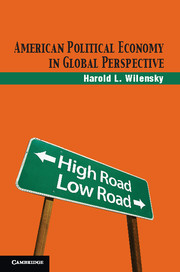Book contents
- Frontmatter
- Contents
- Figures
- Tables
- Preface and Introduction
- Acknowledgments
- Part I Globalization, Public Policy, and the Well-Being of People
- 1 The Welfare State as the Center of Public Finance and Political Conflict
- 2 Energy Policy and Performance
- 3 What Trade-Offs Are Good and Bad for the Economy?
- 4 Retrenchment of the Welfare State?
- 5 Pensions Converge, U.S. Health Care Remains Unique
- 6 The Impact of “Globalization”
- Part II Moving the United States Off the Low Road
- Appendix
- Notes
- Bibliography
- Index
6 - The Impact of “Globalization”
An Overview
Published online by Cambridge University Press: 05 June 2012
- Frontmatter
- Contents
- Figures
- Tables
- Preface and Introduction
- Acknowledgments
- Part I Globalization, Public Policy, and the Well-Being of People
- 1 The Welfare State as the Center of Public Finance and Political Conflict
- 2 Energy Policy and Performance
- 3 What Trade-Offs Are Good and Bad for the Economy?
- 4 Retrenchment of the Welfare State?
- 5 Pensions Converge, U.S. Health Care Remains Unique
- 6 The Impact of “Globalization”
- Part II Moving the United States Off the Low Road
- Appendix
- Notes
- Bibliography
- Index
Summary
In recent decades, one group of social scientists has argued that the nation-state is eroding in its political capability and analytical utility. They include Immanuel Wallerstein in his analysis of the relations of core, semiperiphery, and periphery in the modern “world system” (1974); Peter Evans in his early treatment of “dependent development” in Latin America (1979); and such students of international relations as Robert Keohane and Joseph Nye (1971 and 1977; cf. Keohane and Nye, 2000) and Peter Gourevitch (1986), who emphasize the increasing power of transnational and international actors (multinational corporations, international organizations) and the global forces of technology, communication, and trade. Globalization theorists who have more recently articulated these themes include Susan Strange (1996), Philip Cerny (1994), Peter Evans (1997), and Louis Pauly (1997). Another similar argument is that the rise of supranational political arrangements such as the EU is eroding the legitimacy of the nation-state (Keating and Hooghe, 2005; McCormick, 2007). These scholars vary in their depiction of the specific sources, degree, and speed of global threats to state autonomy. But when they analyze national differences in public policy, they all argue that a nation’s position in the world economy determines its institutions and policies more than anything else, or at least is becoming a prime determinant.
A second group of scholars, which includes myself (1975, 1976, 1981, 1983, 1987, 2002, 2006), Peter Katzenstein (1985), Peter Flora (1986; Flora and Heidenheimer, 1981), David Cameron (1982, 1984), Hugh Heclo (1974), Gosta Esping-Anderson (1985), Walter Korpi (1978), Paul Pierson (2001), Iverson and Cusack (2000), Hemerijck and Ferrera (2004), Brady, Beckfield, and Seeleib-Kaiser (2005), Jonah Levy (2006), Brady, Beckfield, and Zhao (2007), and most students of the welfare state, are much more impressed with the importance of national differences in social, political, and economic organization as sources of variations in public policy and system performance.
- Type
- Chapter
- Information
- American Political Economy in Global Perspective , pp. 88 - 152Publisher: Cambridge University PressPrint publication year: 2012



